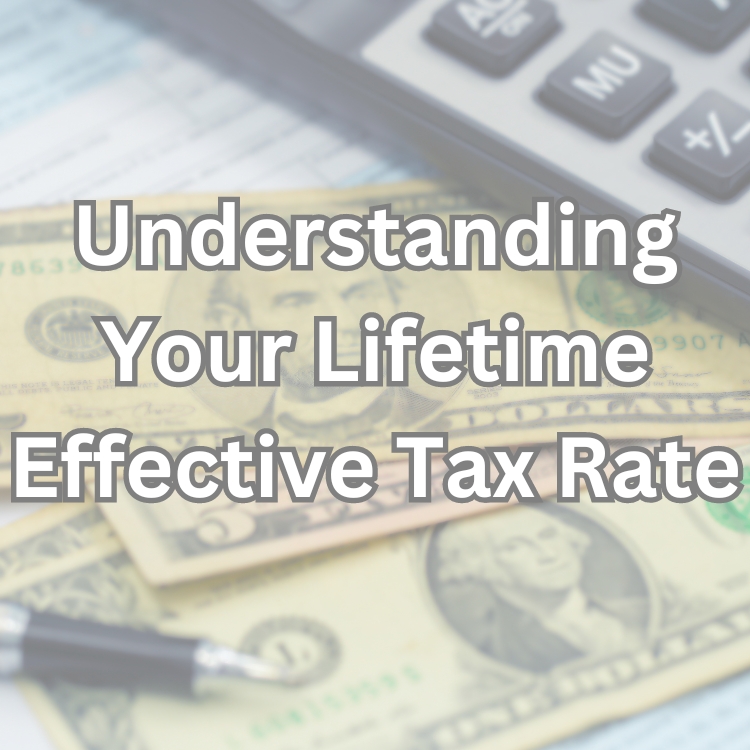When it comes to financial planning, most people focus on their income, savings, investments, and retirement accounts. While these are critical components, one often overlooked factor can have a significant impact on your overall financial health: your “Lifetime Effective Tax Rate” (LETR). In this blog post, we’ll explore why it’s important to understand your Lifetime Effective Tax Rate, what it is, and how understanding it can help you make smarter financial decisions throughout your life.
What is the Lifetime Effective Tax Rate?
The Lifetime Effective Tax Rate is the percentage of your total income that you pay in taxes over the course of your entire life. Unlike the annual tax rate, which reflects the taxes you pay on your income in a single year, LETR takes a long-term view, considering all the income you’ll earn and all the taxes you’ll pay from the time you start earning until the end of your life.
For example, if you earn $2 million over your lifetime and pay $500,000 in taxes, your Lifetime Effective Tax Rate would be 25%.
Why is the Lifetime Effective Tax Rate Important?
Understanding your LETR is crucial because it offers a comprehensive view of how taxes will impact your wealth over the long term. Here’s why it matters:
- Holistic Financial Planning: Taxes don’t just affect your annual take-home pay; they play a significant role in determining how much wealth you can accumulate over your lifetime. By planning with LETR in mind, you can make more informed decisions about saving, investing, and spending.
- Informed Retirement Planning: The taxes you pay in retirement can have a substantial impact on your lifestyle. By understanding your LETR, you can make strategic decisions about which retirement accounts to use, when to take withdrawals, and how to manage your income in retirement to minimize your tax burden. This provides ultimate flexibility in the amount of taxes you’ll pay.
- Strategic Income Timing: Your income is likely to fluctuate over your lifetime, and so will your tax rate. By timing certain income streams, such as bonuses, capital gains, or withdrawals from retirement accounts, you can manage your LETR and potentially reduce the total amount of taxes you pay over your life. Sometimes “Roth Conversions,” can also play a crucial piece of your long-term tax planning projections.
- Optimizing Estate Planning: The LETR also plays a role in estate planning. By considering the taxes you’ll pay over your lifetime, you can develop strategies to minimize the tax impact on the wealth you pass on to your heirs.
How Can You Optimize Your Lifetime Effective Tax Rate?
Now that you understand the importance of LETR, let’s look at some strategies to help you optimize it:
- Tax-Efficient Investment Strategies: Consider investing in tax-deferred accounts like 401(k)s or IRAs, which allow your investments to grow without being taxed until withdrawal. Additionally, municipal bonds can offer tax-free interest income, reducing your LETR. Lastly, don’t forget to “Harvest” any passive losses you may have, when an opportune time arises to do so.
- Income Allocation: If possible, try to smooth out your income over the years to avoid jumping into higher tax brackets. For example, spreading out the receipt of a large bonus or managing capital gains over multiple years can help lower your overall tax rate, allowing you to keep more of your money.
- Charitable Contributions: Charitable giving can be a powerful tool in reducing your taxable income, which can lower your LETR. Donor-advised funds and other charitable vehicles can be particularly effective in managing the timing and impact of your donations.
- Tax-Efficient Withdrawals in Retirement: Planning your withdrawals from different retirement accounts in a tax-efficient manner is crucial. For example, you might choose to withdraw from taxable accounts first to allow tax-deferred accounts to continue growing, or you might convert traditional IRA assets to a Roth IRA during years when your income is lower. Every situation is different, and understanding your LETR will help in the timing of these more complex planning topics.
- Utilizing Tax Credits and Deductions: Throughout your life, take advantage of available tax credits and deductions, such as those for education, energy efficiency, or healthcare expenses. These can significantly reduce your taxable income and, in turn, your LETR.
Conclusion
Understanding your Lifetime Effective Tax Rate is critical, but is often still an overlooked aspect of financial planning. By understanding and managing your LETR, you can make smarter decisions about how to save, invest, and spend your money throughout your life. This proactive approach can help you build and preserve more wealth, ensuring that you keep more of what you earn and achieve your long-term financial goals.
As a financial planner, our goal is to help you navigate the complex planning opportunities & strategies available, such as proactive tax planning and optimizing your Lifetime Effective Tax Rate. Together, we could develop a strategy that aligns with your unique financial situation and helps you achieve a secure and prosperous future.
If you’d like to learn more about how to manage your LETR and integrate it into your financial plan, don’t hesitate to reach out.
Curious about our other content? You can check it out here.







